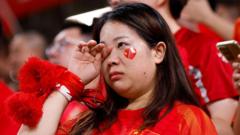China's passionate pursuit of football dominance has taken a severe hit as recent humiliating defeats and corruption scandals have marred the nation's sporting ambitions. Once dreaming of becoming a football superpower under President Xi Jinping's leadership, the Chinese national team now languishes in the 90th position on the FIFA rankings, a stark contrast to its thriving economy and substantial population.
The most recent debacle occurred during a World Cup qualifier against Japan, where the team suffered a staggering 7-0 loss, marking its most significant defeat on the international stage. This outcome followed a series of disappointing performances, further compounded by a nationwide crackdown on corruption that led to the arrest of numerous players, coaches, and officials for gambling and match-fixing.
Xi Jinping's dream of elevating Chinese football through grassroots development took a backseat to a system entrenched in political influence and state-driven decisions, undermining the organic growth necessary for success. Despite the Chinese Football Association's (CFA) calls for autonomy, the communist hierarchy's grip has stymied progress. The association's president, a member of the Communist Party, exemplifies how political appointments remain prevalent, leading to decisions made without proper football expertise.
Mark Dreyer, a sports writer based in Beijing, articulates that optimal footballing outcomes depend on nurturing talent from the bottom up, a foundational aspect missing in China’s approach. While other nations have robust football infrastructures, China suffers from a negligible grassroots effort, with fewer than 100,000 registered players compared to millions in more developed football nations.
Though the men's team faces ongoing ridicule, the women's team has performed admirably, showcasing a contrasting success story in the landscape of Chinese sports. However, the effects of the pandemic have devastated professional leagues, making it even more challenging to sustain normalcy within the football community amid growing public dismay.
One notable revelation stems from a documentary exposing pervasive corruption in Chinese football, with former national team manager Li Tie confessing to decades of bribery and match-fixing, further eroding trust in the sport. As this scandal unfolds, the people’s passion for football remains, yet the pathway to honor their national team lies fraught with obstacles.
In the face of consistent losses and systemic failures, many fans have adopted a humorous perspective about their team’s dismal performances. Yet this sentiment cannot mask the underlying disappointment, as calls for a more organic, skill-focused approach juxtapose against a backdrop of political interference. This ongoing journey reveals just how far China must go to realize its dormant footballing potential and foster a culture that nurtures not only talent but also a genuine love for the game.

















